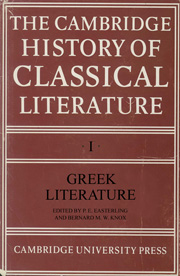Book contents
- Frontmatter
- 1 Books and readers in the Greek world
- 2 Homer
- 3 Hesiod
- 4 The epic tradition after Homer and Hesiod
- 5 Elegy and iambus
- 6 Archaic choral lyric
- 7 Monody
- 8 Choral lyric in the fifth century
- 9 Early Greek philosophy
- 10 Tragedy
- 11 The satyr play
- 12 Comedy
- 13 Historiography
- 14 Sophists and physicians of the Greek enlightenment
- 15 Plato and the Socratic work of Xenophon
- 16 Oratory
- 17 Aristotle
- 18 Hellenistic poetry
- 19 Post-Aristotelian philosophy
- 20 The literature of the Empire
- 21 Epilogue
- Appendix of authors and works
- Metrical appendix
- Works Cited in the Text
- References
5 - Elegy and iambus
Published online by Cambridge University Press: 28 March 2008
- Frontmatter
- 1 Books and readers in the Greek world
- 2 Homer
- 3 Hesiod
- 4 The epic tradition after Homer and Hesiod
- 5 Elegy and iambus
- 6 Archaic choral lyric
- 7 Monody
- 8 Choral lyric in the fifth century
- 9 Early Greek philosophy
- 10 Tragedy
- 11 The satyr play
- 12 Comedy
- 13 Historiography
- 14 Sophists and physicians of the Greek enlightenment
- 15 Plato and the Socratic work of Xenophon
- 16 Oratory
- 17 Aristotle
- 18 Hellenistic poetry
- 19 Post-Aristotelian philosophy
- 20 The literature of the Empire
- 21 Epilogue
- Appendix of authors and works
- Metrical appendix
- Works Cited in the Text
- References
Summary
ARCHILOCHUS
Archilochus is in many ways the focal point for any discussion of the development of literature in the seventh century, since he is the first Greek writer to take his material almost entirely from what he claims to be his own experience and emotions, rather than from the stock of tradition.
By a happy coincidence this central figure is also precisely datable. He was a contemporary of Gyges, king of Lydia c. 687-652 (fr. 19). He alludes to the destruction of Magnesia by the Cimmerian Treres in or about the latter year (fr. 20), and seems himself to have been of military age at the time. In fr. 122 he speaks of the recent wonder of a total eclipse of the sun, which (despite recent attempts to revive the claims of 711 or 557) must be the eclipse of 6 April 648.
Archilochus the Parian presents himself as a man of few illusions, a rebel against the values and assumptions of the aristocratic society in which he found himself. A plausible explanation of this tension, to which we owe much of the interest of Archilochus' work, is to be found in the circumstances of his life. He came of a notable family. His grandfather (or great-grandfather?) Tellis had joined in taking the cult of Demeter to Thasos towards the end of the eighth century, and was to be immortalized in a great painting at Delphi by the Thasian Polygnotus (Paus. 10.28.3). The poet's father, Telesicles, also won distinction, as the founder of the Parian colony on Thasos.
- Type
- Chapter
- Information
- The Cambridge History of Classical Literature , pp. 117 - 164Publisher: Cambridge University PressPrint publication year: 1985
References
- 2
- Cited by



